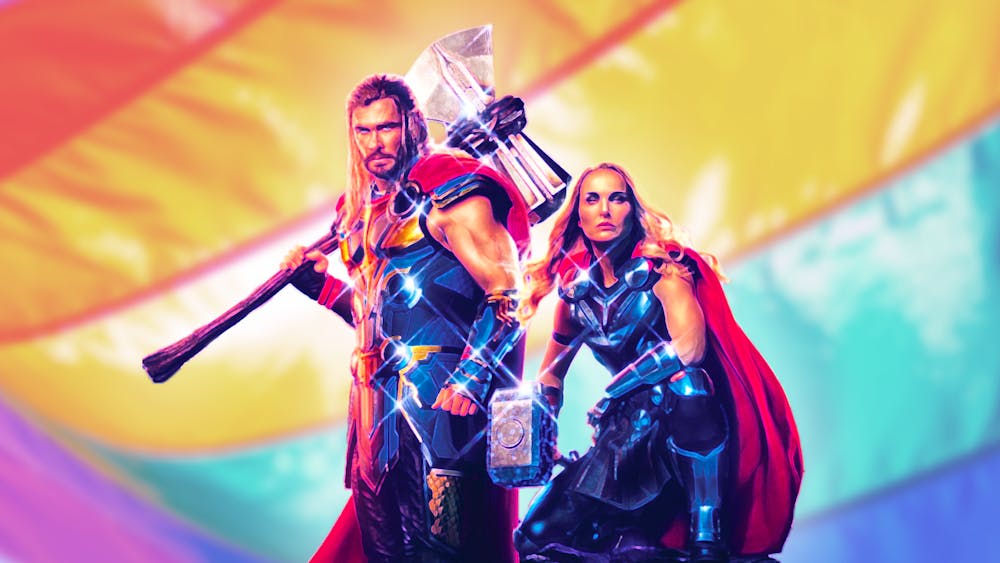After the success of Thor: Ragnarok, many fans had high hopes for director Taika Waititi’s sequel Thor: Love and Thunder. However, the film released to mixed reviews, becoming one of the worst–rated Marvel Cinematic Universe (MCU) movies on Rotten Tomatoes.
Critics are mostly debating whether the film successfully balances its humor with its seriousness or whether it’s just Ragnarok redone. LGBTQ fans, however, are panning the film for other reasons: alleged queerbaiting.
Queerbaiting is the practice of using marketing or narrative undertones to imply a movie or show’s characters are queer without ever saying they are. It hooks in viewers who are seeking queer representation while avoiding officially outing a character or writing thoughtful LGBTQ storylines. But not only is it lazy storytelling, queerbaiting also allows the picture to retain the support of LGBTQ audiences, homophobic fans, and corporate sponsors alike. Similarly, queerbaiting allows films to be premiered in certain international theaters, as content with LGBTQ storylines is banned in multiple countries. For instance, Disney (which owns the MCU) has cut queer scenes from their movies in the past to pass these censors.
It’s relatively common for Marvel shows and movies to be accused of queerbaiting. What stands out about the accusation against Love and Thunder, however, is that the movie is explicitly queer—more so than any other Avenger–led Marvel movie yet. Love and Thunder includes two officially queer central characters and one officially gay relationship. While the movie's central interpersonal focus is still on the relationship between the movie’s straight leads, Thor and Jane Foster, this amount of representation in a major Marvel property—not a side movie or streaming–only TV show—is groundbreaking for the franchise.
Why, then, is Love and Thunder being called a disappointment in queer representation?
Because of high expectations based on Waititi’s other work (plus promotion from him and the cast), fans are saying Waititi overpromised. Instead of queer supporting characters, fans expected queer relationships as central as Thor and Jane's—and the film's promotion never rejected that possibility. Saying Waititi overpromised, though, ignores the corporate resistance that surely faced him and his cowriter.
The conversation about LGBTQ representation in Thor: Love and Thunder is a storied one. It begins with Waititi’s first Marvel film, Thor: Ragnarok, released in 2017.
In Thor: Ragnarok, the filmmakers cut a scene depicting a woman walking out of Tessa Thompson's character, Valkyrie's, bedroom. This scene would have made Valkyrie the first officially bisexual character on–screen in an MCU film and one of the franchise's first LGBTQ characters. Thompson, who is bisexual herself, stated that in spite of this cut scene, she played Valkyrie as bisexual, and she believes that the emotional scene where Valkyrie falls away from another Asgardian woman is explicitly romantic. In an interview with The Mary Sue, Thompson confirms, “There’s a great shot of me falling back from one of my sisters who’s just been slain. In my mind, that was my lover.”
At San Diego Comic–Con in 2019, Thompson and Marvel president Kevin Feige confirmed that Valkyrie would be the MCU’s first officially–LGBTQ hero with an LGBTQ storyline. Thompson commented that Valkyrie, the new king of Asgard, “needs to find her queen. That is her first order of business.” Thompson also said that Valkyrie’s sexuality had been extensively discussed during Love and Thunder’s production, becoming a strong tenet of the movie. Online, these statements were understood as a promise that Valkyrie would date a woman in Love and Thunder.
When the Love and Thunder's trailer was released, fans took note of an interaction where Chris Pratt’s Star–Lord tells Chris Hemsworth’s Thor, “If you ever feel lost, just look into the eyes of the people you love.” As Star–Lord gazes back toward his fellow Guardians of the Galaxy, Thor wedges his face into his line of sight, leading to a somewhat tongue–in–cheek speculation that Thor has a crush on Star–Lord, a reading that Waititi humored.
The cherry on top of the building hype ahead of Love and Thunder was a Tiktok video from the film’s London premiere. During a fan Q&A, one audience member asked, “How gay is Love and Thunder?” Waititi gestures to Natalie Portman, who plays Jane Foster—now the Mighty Thor herself—to answer. She quietly says into her microphone, “So gay.” Waititi shouts, “It’s super gay!” as the crowd whoops and Thompson celebrates.
So, how gay is Love and Thunder actually? The central romance is heterosexual, between Thor and his ex–girlfriend Jane, but the two other members of the four–person team of heroes are officially gay. Valkyrie finally confirms her sexuality in a line delivered by Korg (played by Waititi), alluding to the loss of her girlfriend in the war scene Thompson highlighted from Ragnarok. She also flirts with another woman in Omnipotent City, kissing her hand as the woman swoons. Korg then mentions his two dads and his own desire to find a man to become a father with, confirming that he, too, is gay.
None of this diminishes the fact that there’s room for more LGBTQ representation in Love and Thunder and that queer fans are right to be frustrated about it. Fans are justified in feeling let down that queer love is not more central to the movie after its promotion suggested it might be, even though Waititi, Thompson, and others likely had to fight so much just to get the representation they were able to. The representation in Love and Thunder should become the minimum standard for incorporating LGBTQ characters into a story.
At its core, Love and Thunder is about exactly what it says it is: love, especially love after loss, and heartbreak. It may not be the gay superhero story of every queer fan’s dreams, but the movie still shows love for its queer characters, more than any MCU movie ever has before. We can both honor the effort that went into this love story and expect better queer representation from the franchise at the same time.







